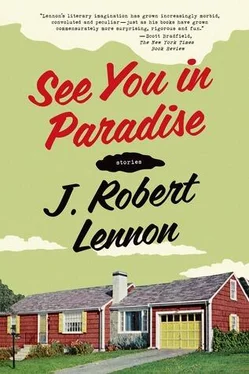“I know. Will they come in?”
“No. I’m a light sleeper. Remember? I get goodnight kisses before I go to my room.”
My God. “Yes, I remember,” I said.
She shook her head, awfully ruefully for a ten-year-old. She said, “I have to go down.” She took the nightgown off the bedpost, looked around the room, and entered the cluttered closet. I heard clothes sliding around on their hangers, and her small body brushing against the hollow-core doors. Whence this shyness? I would never again dress her for school. When she came out she seemed to be glowing. I suppose it was the light, what there was of it from the street.
“You look like an angel,” I said.
“Whisper.”
I said it again, quiet this time.
She went downstairs. “Comfy-girl,” said her stepfather. “Come,” said my ex-wife. To the sofa? They watched television for a long time. Please, Anna, I thought, don’t fall asleep; don’t let them carry you up here. Sitting on her bed, it was easy to remember being her age, being in my room, the only place I truly liked, where nobody would bother me, and where all my books were. Weather! I loved weather; I had dozens of books on the subject. I made my own hygrometer and barometer, which were fastened to a ledge outside my window. I kept careful records of temperature and pressure and wind speed. When I told my fourth grade teacher, he said, “Well, Luther, if your instruments are right up against the house, none of the readings will be accurate. A house exudes heat and blocks the wind.” He was right. I put my notebooks away but left the instruments outside, where they remained until they were blown into the shrubs during a freak summer windstorm. Why was I so sensitive? Why did I give up, give in so easily? I could pay a shrink a small fortune to find out, but I never will.
Anna came back. The Winnie-the-Pooh clock on her desk read 9:45. I had given the clock to her, for one birthday or another.
“They let you stay up late,” I whispered.
“Sh.” She climbed into bed beside me and bent her body around my seated form. I wasn’t sure what I was supposed to do, so I stayed where I was and found her hand under the covers. I held it and she held back. She fell asleep so quickly, with the speed of a child: it still takes me the better part of an hour. Yet I must have fallen asleep, too, for when I next looked at the clock, Tigger’s tail had swished nearly to eleven.
“Anna,” I had told her five years before, “your mother and I love each other very much.” It was the first and only lie, or at least the only one I remember. Since then my record has been unblemished. “But we can’t live together anymore. It isn’t because of anything you did, in fact you’re the best thing in our lives, and we love you more than anything in the entire world. Mostly you’ll stay with Mama but sometimes you’ll stay with me, too. We’ll have a good time together, I promise.”
I practiced so hard, really I did. But Anna cried and cried and said, “I’ll be good!”
I pulled my damp hand out of hers. The television was silent. Out in the hall, there was no noise and little light. The master bedroom door was shut. I wanted to go in, I wanted to see my ex-wife sleeping, but of course I didn’t. That is just not something people do. I tippy-toed down the stairs and out the door. No alarm, of course. They are convinced they are safe, and they’re probably right. The world is not as dangerous as we like to think. The odds are good, really, if you’ve got a few bucks and don’t smoke and live in a decent neighborhood. I don’t think there have been better odds ever, in the history of man.

I got back at about five thirty in the morning. I don’t think I was awake all the way. Oh, I had my eyes open, I stayed inside the lines, all right: but I believe I dreamed. In my dream, my waking dream, it was the future. Not much looked different. The cars were a little sleeker, that’s all, and people wore their collars turned up. And I was older, and so was Gwen, and we had two children, daughters, twins, as old as Gwen was now. And they looked just like her! Their wide faces like suns, warmth-giving, powered by unimaginable forces. And the three of them could read each other’s minds, but they didn’t do it when I was around, out of politeness. It was a good dream.
When I was nearly home I got to thinking that I could use Gwen’s idea after all. I could have my students write a future journal. We’d start out easy: What will your life be like tomorrow? To give them a quick success, to get them motivated. Then the next week it would be: What will your life be like next week? And then: Next month? Next year? Where will you be in twenty years? Fifty? What will your children, your grandchildren, your great-great-great-great grandchildren do? Who will they be? Maybe I would do the assignments with them. In my journal I could follow the lives of the dream-twins, and of Anna, and make all kinds of outlandish predictions that would amuse and delight the children and fill me with a sense of goofy well-being.
Of course, I had quit my job.
I parked outside Gwen’s condo and let myself in with my key. She was still asleep. Today was to be a special day for us: a trip, a dip in the lake, a romantic evening at her place. I slid into bed and put my arms around her. She stirred, turned.
“Hmm? What time is it?”
“Almost six,” I whispered.
She sat up. Hair stuck to her face. And the smell of her! Like a clump of hot grass that had grown here in the night. “When’d you get in?” she said.
“Just now.”
“Luther. Where the hell were you?”
We both waited for my answer. Instead, I said, “You didn’t really tell Doug what I asked you to tell him, did you?”
“Besides your having quit?”
“No, that. That I quit.”
“Luther, you asked me to.”
“You don’t mean you told him.”
“I did what you asked.”
Daylight was gathering. Her arms were crossed over her lovely breasts. What could I do? I burst into tears. “Oh God,” I said, “what have I done?” I fell against her: how wonderful to be here, wracked by emotion, in the arms of my lover! A question formed in my mind — Marry me? — but I held it.
“Oh, baby,” she said, stroking my hair, “no, I’m sorry, I was kidding — I didn’t say anything at all to Doug, nothing at all. No, no …”
Okay, that was a mean trick. But I deserved it. Asking her to quit for me was lame, I knew that all along. I kept on sobbing, and let her rock me until her back hurt too much and she had to get up. For a time, while she showered, I was alone in her bed. Posters covered the walls, she’d had them since college. Monet, French movies, kittycats. The woman I love has cat posters, I said aloud. I heard the water turn off, saw the bright flash of robe as she passed in the hall. By the time she returned with the paper I was ready to tell her what I’d done.
The dog who died was his once. Flop-eared, hang-tongued, the color of television static, Bounder had appeared to him at a highway Gas-n-Go near (but not in) Mitchell, South Dakota, home of the Corn Palace. Owing to his matted locks and his tee shirt with the word BULLSHIT printed on it, he’d been refused the men’s room key and so was forced to piss in the weeds out back, behind the propane tank, while the Christian-fundamentalist proprietress glared at him through a torn screen door. I’ve never felt so free, he told himself, and said it aloud, to the giant spun-sugar sky: “I’ve never felt so free!” But it wasn’t true. There was a woman waiting for him in the car. He was trying to dump her but she wouldn’t let him. “Don’t be ridiculous,” she’d said in their motel bed, then rolled naked onto him, which had the time-honored effect.
Читать дальше













